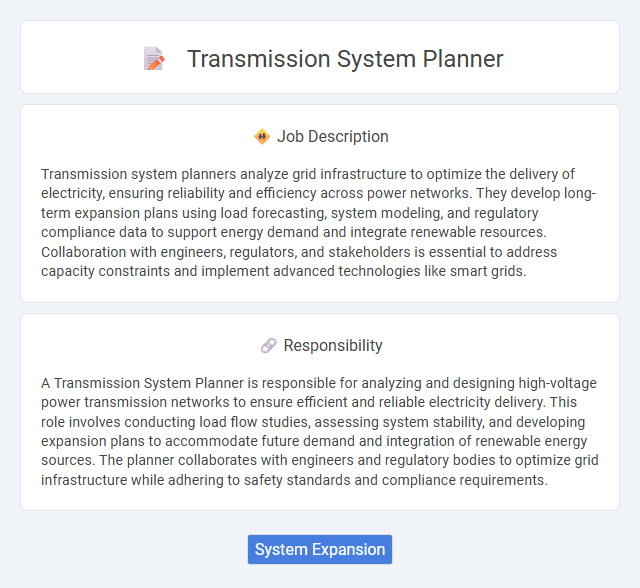
Transmission system planners analyze grid infrastructure to optimize the delivery of electricity, ensuring reliability and efficiency across power networks. They develop long-term expansion plans using load forecasting, system modeling, and regulatory compliance data to support energy demand and integrate renewable resources. Collaboration with engineers, regulators, and stakeholders is essential to address capacity constraints and implement advanced technologies like smart grids.
Transmission system planner roles may suit individuals who possess strong analytical skills, attention to detail, and an aptitude for solving complex engineering problems. Candidates with a background in electrical engineering or related fields, coupled with the ability to work under pressure and coordinate with multiple stakeholders, are more likely to thrive in this position. Those lacking technical expertise or the capacity to adapt to evolving energy systems and regulations might find this career challenging.
Qualification
Transmission system planner jobs require a strong foundation in electrical engineering or power systems engineering, typically supported by a bachelor's degree. Expertise in grid modeling, load forecasting, and renewable energy integration is crucial, along with proficiency in industry-standard software like PSS(r)E or PowerWorld Simulator. Proven experience in regulatory compliance and project management enhances a candidate's ability to design reliable and efficient transmission networks.
Responsibility
A Transmission System Planner is responsible for analyzing and designing high-voltage power transmission networks to ensure efficient and reliable electricity delivery. This role involves conducting load flow studies, assessing system stability, and developing expansion plans to accommodate future demand and integration of renewable energy sources. The planner collaborates with engineers and regulatory bodies to optimize grid infrastructure while adhering to safety standards and compliance requirements.
Benefit
A Transmission System Planner likely enhances grid reliability and efficiency, leading to reduced outages and improved power distribution. This role probably offers opportunities for career growth in the energy sector due to increasing demand for sustainable infrastructure. Professionals in this field may also benefit from competitive salaries, job stability, and involvement in cutting-edge technological advancements.
Challenge
Transmission system planner roles likely involve navigating complex challenges related to integrating renewable energy sources and managing grid reliability amid evolving regulations. The probability of facing uncertainties in demand forecasting and technological advancements may require adaptive problem-solving skills and strategic resource allocation. Addressing these challenges could be critical for ensuring efficient, resilient transmission infrastructure development.
Career Advancement
Transmission system planners design and optimize electrical grid infrastructure to ensure reliable power delivery, leveraging advanced simulation tools and regulatory knowledge. Career advancement opportunities include progressing to senior planning engineer, project manager, or grid operations specialist roles, often requiring expertise in smart grid technology and renewable integration. Gaining certifications such as PE (Professional Engineer) and experience with energy market regulations significantly enhances prospects in this specialized field.
Key Terms
System Expansion
Transmission system planners specialize in designing and optimizing infrastructure to support reliable electricity delivery through extensive grid system expansion. They utilize advanced load forecasting, network analysis, and geographic information systems (GIS) to identify areas requiring new transmission lines or upgrades to existing assets. Their work ensures grid capacity meets future demand, integrates renewable energy sources, and maintains system stability and resilience.
 kuljobs.com
kuljobs.com